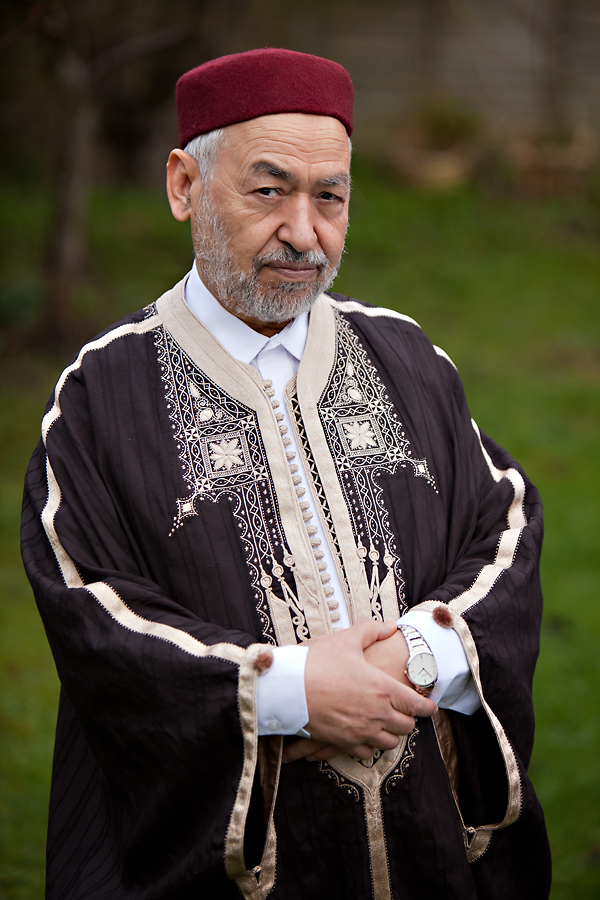TUNIS â€" In the days after the fall of the regime of Tunisian President Zine El Abidine Ben Ali in January 2011, the long-exiled founder of the Ennahda movement Rached Ghannouchi made a triumphant return. The Ennahda political party, which hold its General Conference later this month, has long been described as "Islamist."
Now 74, Ghannouchi outlined to Le Monde a major ideological shift that his party is currently undergoing. The Ennahda movement, which has a majority in the Tunisian Constituent Assembly, is now seeking to define itself as a civil movement. Ghannouchi says that since the 2011 revolution and the adoption of the new Constitution in 2014, there is no point in referring to the term “political Islam†anymore.
Le Monde: During the May 20-22 Ennahda General Conference, the party is expected to reformulate its core doctrine in what appears to be a turning point in its political history. What will it consist in?
Rached Ghannouchi: One of the major points that will be discussed during the Congressâ€TMs agenda is the link between both religious and political dimensions within the party. We aim to show that we are a civil and democratic party, based on both Islamic and modern civilization values. These values are the same as those found in the 2014 Constitution. They reflect the dual understanding we have of the terms modernity and identity. We are going to shift towards a party that devotes itself to political action only.
Is Ennahda breaking its historical bind with Islam?
This is exactly what we are trying to do by distinguishing political activities with religious preaching. Political activism has no place in a mosque. It is a place where Muslims can come together, and should not be used by any political party as a means to preach its own ideas. We want religion to be a way for Tunisians to come together, and not to be divided.
This is why we donâ€TMt want imams to become political leaders, or even party members in the long run. We want our party to tackle daily issues that are important to families. We donâ€TMt want a party that focuses on Day of Reckoning Day, Reaching Paradise, and so on.
Political and religious activities must be independent from one another. And such clear-cut distinction is positive for both sides: politicians will no longer be accused of manipulating Islam to achieve political ends, and religion will never be taken as hostage by politics or monitored by it.
What are the reasons for such a turning point?
We are taking a step, among many others, toward a more mature society. We believe that political Islam â€" though we donâ€TMt like the term itself, which was coined by the West â€" was a direct reaction to two factors. It was a way to fight against both dictatorship and secular extremism. The Jasmine Revolution in 2011 (that overturned the regime) put an end to both. Tunisia is now a democracy. The 2014 Constitution limited secular and religious extremisms. We no longer need political Islam in Tunisia. Besides, groups such as al-Qaeda and ISIS corrupted the concept in itself. This is why we need to distance ourselves from such jihadist organizations that advocate an extremist view on Islam.
Can we conclude that Ennahda is leaving behind political Islam?
Exactly. We depart from political Islam to enter a Muslim democracy. We are democratic Muslims that no longer refer to political Islam.

Ghannouchi in 2011 â€" Photo: Ennahda
There is currently a debate in Tunisia regarding gender inequality concerning inheritance. Whatâ€TMs your stance on the subject?
This is not a popular debate but an elitist one. Tunisian people believe there are bigger priorities. Many Tunisians, including some of the elite, consider it not to be an issue but a diversion.
Since Habib Bourguibaâ€TMs presidency (1957-1987) all political leaders remained faithful to that statement written in the Koran and which is part of our identity and culture. Caricaturing the rule stating that the woman inherits only half the portion of the manâ€TMs is wrong. It is a much more complex issue.
Decriminalizing homosexuality is another burning issue in some Tunisian areas. Do you support it?
We abide by Tunisiaâ€TMs laws, which distinguish between private and public space. Neither law nor religion has a right to meddle with private life. The law belongs to the public sphere, while the private sphere has to do with individual liberty.
Since the beginning of 2015, youâ€TMre part of a government coalition ruled by the party of Nidaa Tounès, your former political opponent. Is it just a matter of government cohabitation or rather a strategic alliance?
This cohabitation is for the countryâ€TMs best interest, as it allows us to learn how to deal with diverging viewpoints, especially in a country like Tunisia where political decisions used not to stem from debate but monopolistic power. We still need to learn how to coexist and live with people who have different perspectives.





